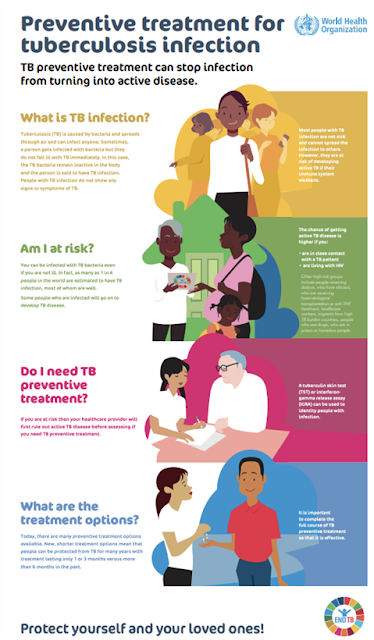The rationale for
Piloting Incentivization for BMU Doctors in Punjab, Pakistan for Successfully
Completing TB Preventive Therapy for Contacts of Bacteriologically Confirmed TB
Patients
Tuberculosis (TB) remains a significant public health concern
globally, including in Punjab, Pakistan. In order to address this issue
effectively, it is crucial to implement strategies that encourage healthcare
providers to actively participate in the prevention and control of TB. One such
strategy that can be piloted is incentivizing BMU (Basic Management Unit)
doctors who successfully complete TB preventive therapy for at least 2 contacts
of 60% Bacteriologically confirmed TB Patients in their respective districts.
This rationale explores the benefits and justifications for implementing this
incentivization program.
1.
Increased adherence to preventive therapy: TB
preventive therapy plays a vital role in reducing the risk of latent TB
infection progressing to active disease. However, completion rates for
preventive therapy are often low due to various reasons such as lack of
awareness, stigma, and logistical challenges. By incentivizing BMU doctors to successfully complete preventive therapy for contacts, it provides an additional
motivator for them to ensure patients complete the full course of treatment,
leading to increased adherence rates.
2.
Improved case detection and contact tracing:
Identifying and treating the contacts of bacteriologically confirmed TB
patients is essential for breaking the chain of transmission. Incentivizing BMU
doctors can encourage them to actively engage in contact tracing and early case
detection. By providing incentives for successfully completing preventive
therapy for contacts, doctors are more likely to proactively identify and treat
potential TB cases, leading to improved case detection rates and reduced
transmission within the community.
3.
Enhanced healthcare provider engagement:
Incentivization can significantly boost healthcare provider engagement in TB
control activities. BMU doctors are key frontline workers in the fight against
TB, and their active involvement is vital for successful prevention and control
efforts. By rewarding doctors for their efforts in completing preventive
therapy for contacts, it fosters a sense of recognition and value for their work,
motivating them to continue their commitment to TB control and prevention.
4.
Capacity building and skill development:
Implementing an incentivization program provides an opportunity for capacity
building and skill development among BMU doctors. To ensure successful
completion of preventive therapy, doctors need to be knowledgeable about TB
diagnosis, treatment guidelines, and monitoring protocols. Incentives can serve
as a catalyst for doctors to enhance their knowledge and skills in TB
prevention, which can have long-term benefits for improved patient care and
management.
5.
Strengthening the healthcare system: By
incentivizing BMU doctors, the program contributes to the overall strengthening
of the healthcare system. It encourages doctors to prioritize TB prevention and
control activities, leading to improved healthcare service delivery.
Additionally, the program fosters collaboration and coordination between
doctors, community health workers, and other stakeholders involved in TB
control efforts, creating a more robust and integrated healthcare system.
6.
Cost-effectiveness and sustainability: While the
implementation of incentivization programs incurs some costs, the potential
benefits outweigh the investment. By increasing adherence rates and early case
detection, the program can lead to substantial cost savings in terms of reduced
treatment costs for active TB cases. Furthermore, the improved outcomes
achieved through the program can contribute to the sustainability of TB control
efforts in the long run.
 |
| TB Preventive Therapy |
Conclusion:
Overall, piloting incentivization for BMU doctors in Punjab,
Pakistan is a strategic and practical step toward addressing the challenges
in TB prevention and control. By creating a supportive and incentivized
environment, the TB Control Program can inspire
healthcare providers, strengthen the healthcare system, and ultimately
contribute to the reduction of TB incidence and the improvement of public
health in Punjab.







.png)
0 Comments
Please do let me know if you need any further assistance